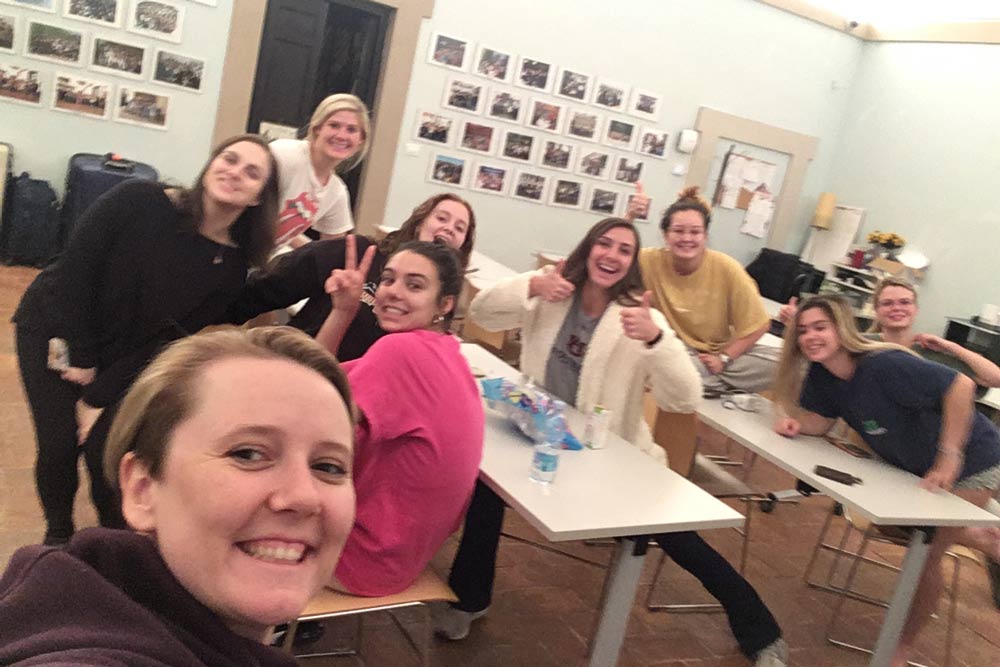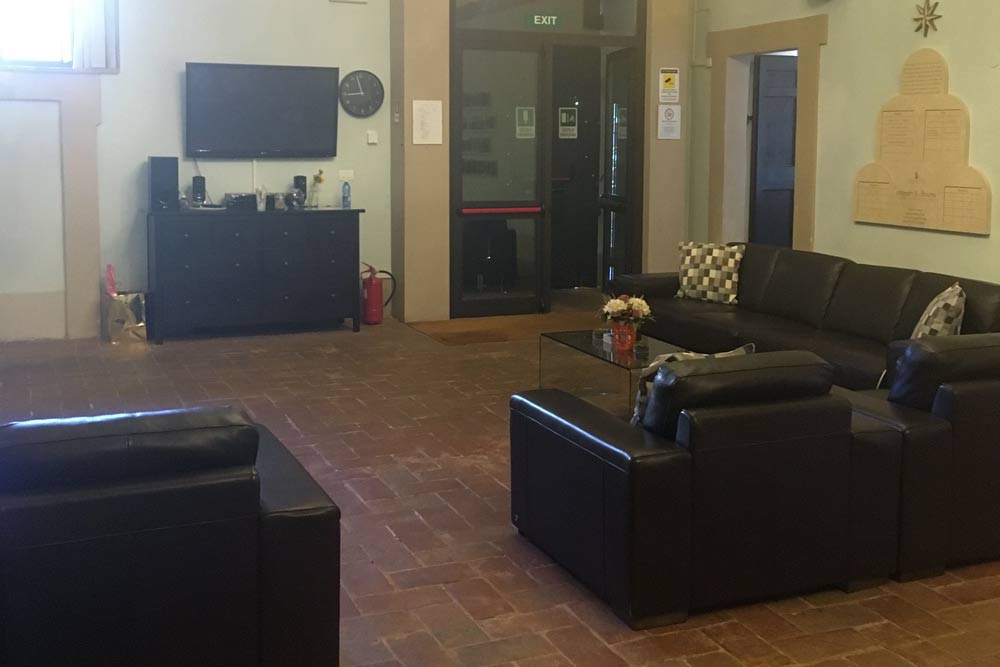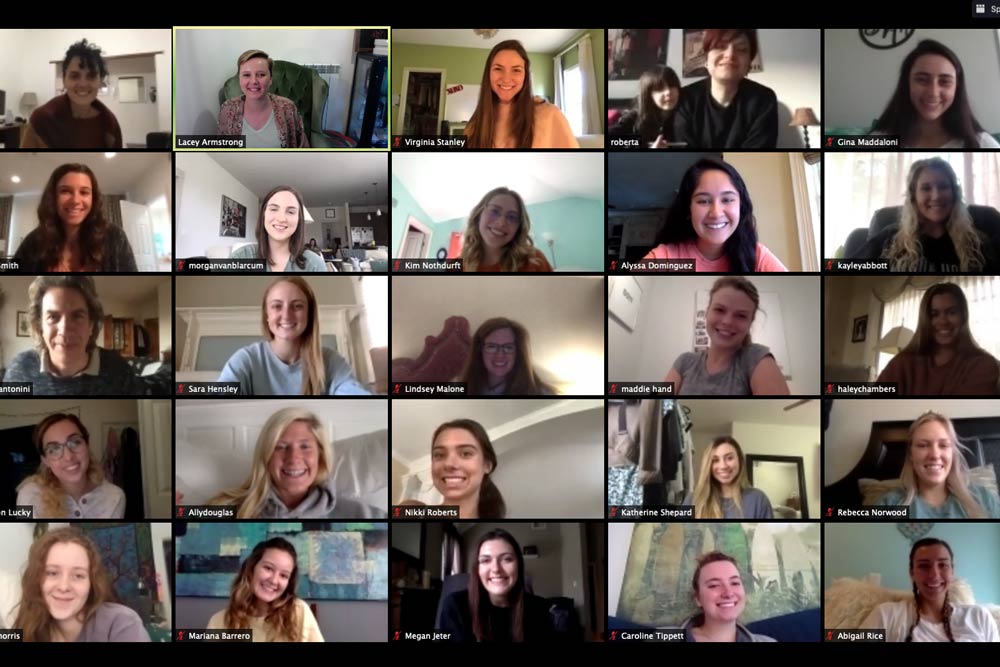
Armstrong and JSB students gathered one final time at 4 a.m. on February 29 to say goodbye.

Students had only a few hours to pack their things and leave the Chigi Palace, where they live during the JSB program.

Armstrong restructured the rest of the spring 2020 semester so students could complete their coursework remotely. They met regularly through Zoom to discuss their lessons and projects.
Just before midnight on Saturday, February 29, Joseph S. Bruno Auburn Abroad in Italy Executive Director Lacey Armstrong was awoken by a neighbor’s loud music pulsing through her apartment complex. Yet her attention was quickly redirected to her phone when the ring of a late-night email notification cut through the block of noise.
The email read: ‘Italy – Level 3: Reconsider Travel.’
“My irritation quickly shifted to concern and a sinking feeling as I saw the email alert from the U.S. Embassy in Rome,” Armstrong said. “The first words of the email set everything else in motion. At that moment I knew we would have to cut short the semester abroad and send our students home due to Auburn University’s travel policies.”
This was the turning point for Armstrong and the students studying abroad in the Joseph S. Bruno Auburn Abroad in Italy program. Just a week before, students were on a field trip to Umbria, exploring small, pedestrian-friendly cities like Orvieto and Assisi, visiting organic wineries, artisan workshops and learning to make handmade pasta. These traveler’s dreams would someday become treasured memories. But as they explored a new culture, whispers of a pandemic spread from the North of Italy.
It started with the news of community transmission in the North, in Veneto and Lombardy, where cluster outbreaks led to lockdowns more than 300 miles away from Ariccia. The novel coronavirus that had quickly spread through nearby countries, leaving widespread illness and staggering death tolls in its wake, had reached Italy. And it was increasingly apparent the virus would not leave as quietly as it arrived.
In the early weeks of the Spring 2020 semester, Armstrong ordered hand sanitizer, implemented hand washing breaks, advised students that travel to the north was off-limits, cancelled field trips to Rome and rearranged the schedule so that the week of class before spring break would be completed in Ariccia. She also worked closely with Roberta Londi and Cinzia Bracalente, staff that work with Interlinea, an Italian company that handles many of the logistical and practical aspects of JSB to organize a variety of fun activities for the students who agreed to stay in Ariccia over spring break.
Yet despite their careful planning, the time had come for students to return home.
12:30 a.m.
Armstrong parked her car in front of the Chigi Palace in Ariccia, the students’ home for their semester abroad in Italy. She walked in and braced herself to deliver the bad news.
Room by room, Armstrong woke the students and asked them to gather in the living room. She explained that because of the increased U.S. State Department Travel Advisory, everyone would need to immediately book tickets home.
“I knew I was about to break the hearts of 22 students who had anticipated coming to this study abroad program since before they even started classes at Auburn,” Armstrong said. “You could see it in their eyes -- some of them knew before the words came out of my mouth, others still could not process that their time in Italy was over even after I had said it. There were some immediate tears and a lot of frustration, resignation and action.”
Just hours before, those students went horseback riding through the Italian countryside and gathered for lunch and a wine tasting. They thought their evening had ended with a taco party in celebration of the first half of spring break and two classmates’ birthdays. But then, they had to pack their things to leave.
Back in Auburn, Global Education Director Kate Thornton called through the list of emergency contacts to let loved ones know their students would be returning home.
-
1 a.m.
Students booked flights, several to depart at 8 a.m. Armstrong reassured parents, helped students navigate airline websites and called overloaded booking hotlines. She and program facilitator Cinzia Bracalente collected flight data and coordinated transportation for students to the airport.
2 a.m.
Every student in Ariccia confirmed their flight back to the U.S. Students finished packing both for themselves and the students who could not return to campus from their Spring Break travels. Due to increasing travel restrictions, the JSB students outside of Italy were required to return directly to the U.S. and their bags would be shipped later.
3 a.m.
Bracalente returned to the Chigi Palace. Students finished packing and prepared to leave. One last time, the spring 2020 JSB class gathered.
“By 4 a.m. we made a group decision that any remaining snacks in the palace were fair game,” Armstrong said. “We passed around half-empty bags of Goldfish crackers and Valentine’s candy, while laughing and contemplating what it would be like once the students were back in the U.S.”
6:45 a.m.
Armstrong and Bracalente stood in somber silence as they waved and watched the last two shuttles depart taking students to the airport. As students arrived at the airport to board flights, Armstrong and Bracalente returned to an empty palace.
11:35 a.m.
The final flight of students departed bound for the U.S., Armstrong and the rest of the Ariccia program staff removed perishable food the students had left behind, cleaned the students’ living quarters in the palace and prepared for a lockdown.
In the following days, other study abroad programs in Italy had difficulty getting their students booked on flights back home due to huge spikes in booking requests. Armstrong said Auburn’s program was ahead of the curve because of its foresight to require students to report their weekend and midterm break travel plans. This made it easier for the staff to track, contact and communicate with students as the COVID-19 situation unfolded.
After a two-week spring break to finish self-isolation guidelines, JSB students moved to a remote learning model at home in the U.S., affectionately named “When Not in Rome.” Armstrong worked with vendors and guest lecturers and adjusted the curriculum so that it could be completed under their new circumstances. The Interlinea staff was instrumental in this transition, with several members going the extra mile to convey Italy’s rich culture remotely.
Bracalente spent hours reviewing different videos to give students a sense of historic sites they didn’t get to visit. Maurizio Antonini and Roberta Londi recorded lectures on Italian culture and food history. And Mary Lou Gray, Maurizio’s 85-year-old mother and the students’ Italian cooking teacher, put together instructional cooking videos so the students could do a cooking class at home. Armstrong said this was a favorite project for students, who were able to share an authentic Italian meal with their families.
“Overall, the ‘When Not in Rome’ learning model turned out better than we could have expected. Students still completed major projects and presentations, but video recorded them, then they were shared with the other students and staff for live Q&A sessions,” Armstrong said. “The students did a great job of leading discussions and asking questions about what they had learned and diving deeper into each given topic.”
This summer, the JSB program faculty and staff will work on expansion plans, review program feedback, update policies, procedures and the website, connect with alumni and prepare for online study abroad fairs. Armstrong said the goal is to help an even greater number of students experience a safe, healthy and rewarding semester abroad through JSB.
“There will always be a ‘pre-pandemic’ and ‘post-pandemic’ program. Although we will do everything we can to keep our program traditions alive, this event, more than any other, has impressed upon us all just how interconnected globalization has made us,” Armstrong said. “Seeing the wildlife return to the waters outside Venice and Rome also reminds us of the impact heavy tourist traffic was having in these areas. This gives us something more to consider as we aim to orient ourselves as a sustainable program. Our leadership team will continue to work to decrease our environmental impact as we optimize student experiences.”
The JSB staff were sad to see the students go, but knew they did the right thing to keep everyone safe. Even though students were devastated, they’ve shown an impressive amount of initiative and heart for their work, even under nonideal circumstances.
For close to two months, Italy was under one of the most restrictive lockdown protocols in the world. Individuals were only allowed to leave the house for groceries or medical care with a self-certification permit. Exceptions including takeout food, hardware stores and going for walks were not permitted.
Now, two and a half months later, after a successful experiment of opening bookstores and baby clothing shops, Italians can get take-away coffee and enjoy outdoor exercise. In the coming weeks, most shops will open with strict requirements to wear masks indoors and on public transportation.
Still, Armstrong is optimistic. Her apartment overlooks the Mediterranean Sea, she takes her coffee on the patio and there is still plenty of toilet paper on the shelves. And she knows that when the pandemic has subsided, Italy will be waiting for Auburn students to return.
“There is nothing quite like watching someone’s face light up as they see the Colosseum for the first time,” Armstrong said. “I can’t wait to welcome students back so we can share the excitement of these discoveries again!”
For more information on the Joseph S. Bruno Auburn Abroad in Italy program,
visit here.